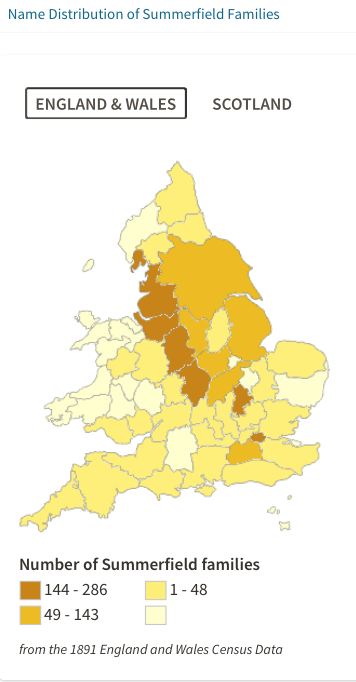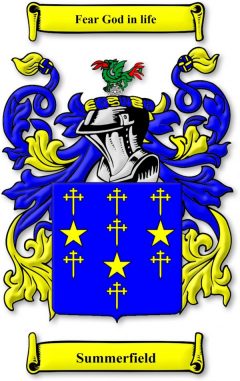What does this surname mean?
Recorded in a number of spellings including Sommerfeld and Somerfeld in Germany, and Somerfield, Sommerfield and the more usual Summerfield in England, this is almost certainly a surname of pre 7th century Germanic & Anglo-Saxon origins. It was residential and described a person who lived either at one of the several places in Germany called Sommerfeld or from Somerfield in the West Riding of Yorkshire, England, or from residence at a field or area of land used only for summer grazing, presumably in the uplands. The name is well recorded heraldically throughout Europe, coats of arms being granted to name holders from such diverse places as Norway, and in Germany, the former states and principalities of Hanover, Prussia, Silesia and Hamburg. In England the first church recordings are late 16th century, but this is probably because earlier records have either been lost or were non-existent. There has been a suggestion that the name came into England with the Huguenots refugees, or possibly in association with the accession to the English throne of King George 1st of Hanover, in 1715, but the earliest recordings pre-date these events.
The surname has also been recorded as originating in “Sommerville, now Sommervieux, near Caen. “Literally the place name meant Sumar’s or Somer’s estate. Spelling variations of this family name include: Sommerville, Summervillle, Somerville, Somerfield, Somervale, Somervile, Summerville, Summervale, Sumeril, Somahan and many more.
First found in Staffordshire, where “the progenitor of the noble family was Walter de Somerville, lord of Wicknor, and of Aston Somerville, in county Gloucester, who came into England with William the Conqueror in the 11th century, and left two sons, who became ancestors respectively of the English and Scottish Somervilles.
Between the 11th and 15th centuries it became customary for surnames to be assumed in Europe, but were not commonplace in England or Scotland before the Norman Conquest of 1066. They are to be found in the Domesday Book of 1086. Those of gentler blood assumed surnames at this time, but it was not until the reign of Edward II (1307- 1327) that second names became general practice for all people.
Early records of the name mention Adam de Somervila who was recorded in 1153 in County Oxford and he appears to be the first of the name on record. William de Summeruill was documented in County Yorkshire in 1158. Other records of the name mention Robert de Somervile and Roger de Somerville who were both listed in Staffordshire during the reign of Edward I. Jacobus de Somerwill was listed in the Hundredorum Rolls of 1273 in Devon and Christopher Grainger and Mary Somervell were married at Westminster in 1639-40. Edward Sommervill and Mary Beaufoy were married at Canterbury in 1669.
These early examples include William Somerfield, a witness at St Giles Church, Cripplegate, city of London, on New Year’s day, in the year 1605, and William Summerfeild, who married Elizabeth Querton, at St James church, Clerkenwell, on January 23rd 1622. The first known recording in Germany is later still, Daniel Sommerfeldte being recorded in the registers of the town of Zullichau, Brandenberg, in 1649. Most German surnames are much earlier, suggesting again that registers or charters have been lost.
The surname was brought to Scotland in the 12th century by William de Somerville, a retainer of David, Earl of Huntingdon, brother of King Alexander I of Scotland and received lands in Lanarkshire. There are numerous early listings of the name in one form or another including: Robert de Sumeruilla who witnessed a charter by Duncan, Earl of Fife, to the nuns of North Berwick in 1177; Ralph de Sumervilla, acolyte, who was promoted to the church of Linton in 1255; and William Somerwele of the Plane, who was a charter witness in Edinburgh in 1492.

